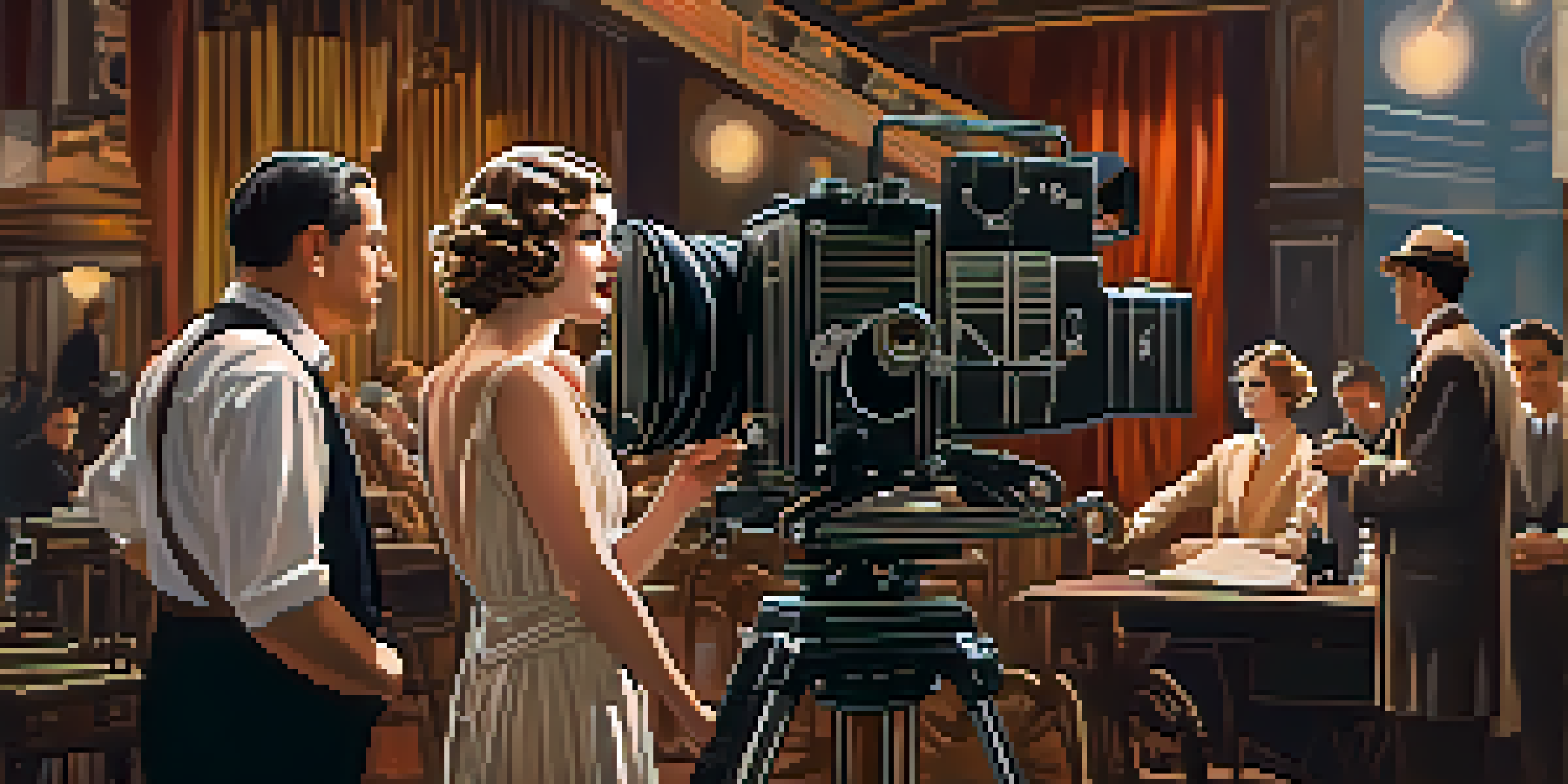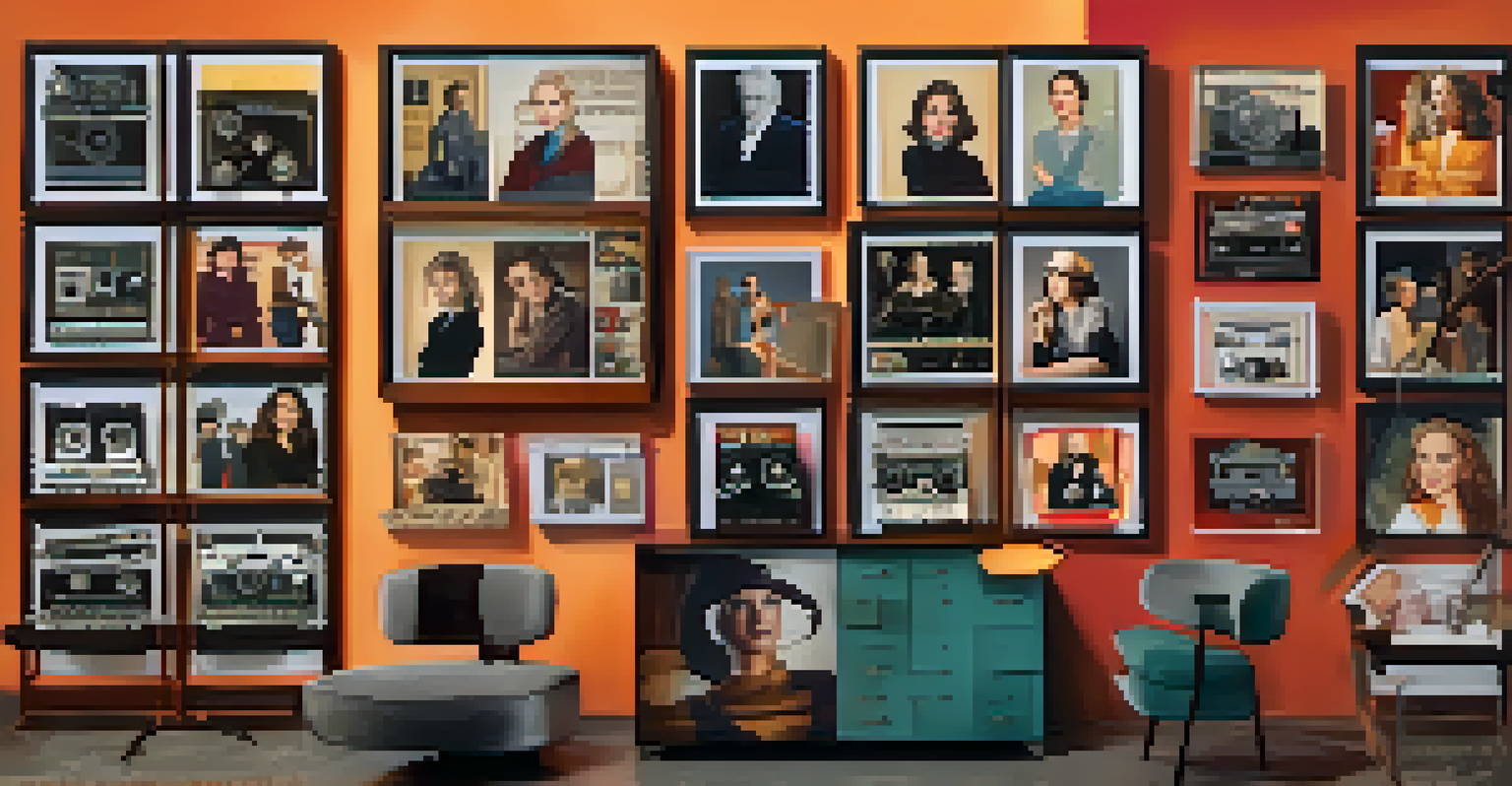Celebrating Women Directors: Pioneers of the Film Industry

The Historical Roots of Women in Film Directing
The journey of women in film directing dates back to the early 20th century, where pioneers like Alice Guy-Blaché began breaking barriers. Despite the male-dominated landscape, these trailblazers crafted narratives that reflected women's experiences and perspectives. Their contributions laid the groundwork for future generations, demonstrating that storytelling knows no gender.
There’s no limit to how much you can do if you don’t care who gets the credit.
As the film industry evolved, so did the opportunities for women. However, the path was not without challenges, as societal norms often relegated women to secondary roles. Yet, the resilience of these early directors inspired others to pursue their passion for filmmaking, proving that determination can shift narratives.
Understanding this history helps us appreciate the significance of women directors today. Their stories remind us of the ongoing struggle for recognition and equality in the arts, urging us to celebrate every milestone achieved by women in film.
Influential Women Directors of the Silent Era
In the silent film era, women like Lois Weber and Dorothy Arzner emerged as influential directors, crafting films that challenged conventional narratives. Lois Weber, in particular, was known for addressing social issues, using her platform to highlight the plight of women and the working class. Her work not only entertained but also educated audiences about pressing societal concerns.

Dorothy Arzner, another luminary, is often credited with being the first woman to join the Director's Guild of America. She directed several films that showcased strong female characters, ultimately paving the way for future filmmakers. Arzner's innovative techniques, such as using sound in film, were groundbreaking and continue to inspire.
Women Pioneered Film Directing
Trailblazers like Alice Guy-Blaché and Lois Weber broke barriers in early cinema, establishing a legacy for future female filmmakers.
These early female filmmakers laid a foundation that would influence generations. By breaking through the glass ceiling, they opened doors for more diverse storytelling in Hollywood, a legacy that is still felt today.
Breaking Barriers: Women Directors of the 1970s
The 1970s marked a transformative decade for women in film, with directors like Lina Wertmüller and Jane Campion gaining international acclaim. Lina Wertmüller became the first woman nominated for an Academy Award for Best Director for her film 'Seven Beauties.' Her unique storytelling style and bold themes showcased the power of female perspectives in cinema.
If you want to be a storyteller, you have to tell the stories that matter to you.
Jane Campion also made waves during this period with her distinct narrative style. Her film 'Sweetie' explored complex family dynamics and gender roles, challenging the status quo. Campion's ability to blend personal and universal themes resonated with audiences, earning her a place as a celebrated filmmaker.
These directors not only achieved commercial success but also influenced a generation of female filmmakers. Their stories continue to inspire, reminding us that artistic expression knows no bounds, regardless of gender.
The Rise of Contemporary Women Directors
In recent years, the film industry has seen a significant rise in female directors, with figures like Greta Gerwig and Ava DuVernay leading the charge. Greta Gerwig's 'Lady Bird' and 'Little Women' have garnered critical acclaim for their authentic portrayal of female experiences. Gerwig's ability to blend humor with heartfelt storytelling resonates with audiences and critics alike.
Ava DuVernay, known for her powerful narratives, has made significant strides in bringing social issues to the forefront. Her film 'Selma' not only highlighted a pivotal moment in history but also showcased her talent for storytelling. DuVernay's commitment to diversity behind and in front of the camera has changed the landscape of Hollywood.
1970s Sparked a Directorial Shift
The 1970s saw influential directors like Lina Wertmüller and Jane Campion reshape the film landscape with compelling female narratives.
These contemporary directors exemplify the growing recognition of women in film. Their contributions challenge stereotypes and inspire a new generation of filmmakers to tell their unique stories.
Representation Matters: The Impact of Women Directors
Representation in film is crucial, and women directors play a vital role in shaping narratives that reflect diverse experiences. When women are behind the camera, stories often shift to encompass different perspectives, leading to richer storytelling. This diversity not only captivates audiences but also fosters empathy and understanding.
Films directed by women often delve into themes that resonate with female audiences, portraying authentic characters and relatable situations. By sharing these stories, women directors challenge societal norms and inspire conversations around gender equality. Their work encourages audiences to see the world through a different lens.
As we continue to advocate for representation, it's essential to support and uplift women in the industry. By amplifying their voices, we contribute to a more inclusive film landscape that benefits everyone.
Challenges Faced by Women Directors Today
Despite the progress made, women directors still face numerous challenges in the film industry. Issues like funding disparities and lack of access to major projects persist, making it difficult for many talented women to break through. These barriers can discourage aspiring filmmakers from pursuing their dreams, stifling creativity and innovation.
Moreover, women directors often encounter implicit biases that undermine their authority on set. This can manifest in various ways, from being questioned about their decisions to facing stereotypes about their capabilities. Such challenges highlight the importance of fostering a supportive environment that champions female talent.
Contemporary Directors Lead Change
Modern filmmakers such as Greta Gerwig and Ava DuVernay are redefining storytelling in Hollywood, emphasizing diverse perspectives and social issues.
Addressing these challenges is crucial for achieving gender equality in the film industry. By advocating for more equitable practices, we can create a space where women directors thrive and continue to enrich the cinematic landscape.
Celebrating Women Directors: A Call to Action
As we celebrate the achievements of women directors, it's vital to recognize the importance of supporting their work. Whether through viewing their films, promoting their projects, or advocating for equitable practices, every action counts. By doing so, we contribute to a more balanced film industry that values diverse voices.
Engaging in discussions about the importance of representation in film can also make a difference. Sharing stories of women directors and their impact helps raise awareness and fosters a greater appreciation for their contributions. It's essential to create a culture that celebrates and uplifts female filmmakers.

Ultimately, the journey of women directors is far from over, and there's much more to be done. Together, we can champion their stories and ensure that future generations of filmmakers have the opportunity to shine.